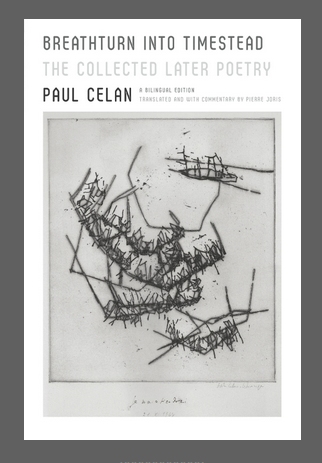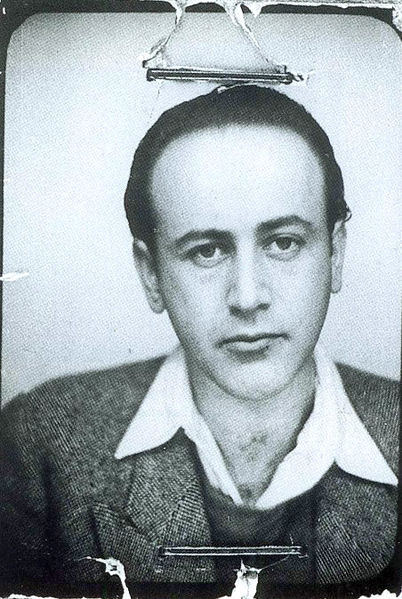Paul Celan and the Meaning of Language — An Interview with Pierre Joris
Above right: Paul Celan, passport photo
Doug Valentine with Pierre Joris An Interview with Pierre Joris
|
|||
| There is great pleasure to be found in Paul Celan’s poetry. His dazzling neologisms (“wordwall”, “smokethin”, “icethorn”) and surreal imagery are testaments to how powerful, beautiful and intriguing imagination can be. But his poetry is difficult to understand, its emotional content buried, it seems, beneath the unspeakable horrors of the Holocaust…..
_________________________ Doug – Before we get to Breathturn, would you please tell me what you think are the core conceptual and emotional components of Celan’s poetry? You’ve spoken of his relationship with the German language; the loss of his mother; his biting sarcasm; and his “optimistic anarcho-socialist strain.” Pierre – There can be little doubt that the core emotional experience for Celan was the loss of his parents, and especially the mother, in forced labor camps. Or, in a wider sense, he was shaped by those historical events that defined the generation(s) of Jewish (and non-Jewish) people who lived through the Nazi period. But it is important to note a very major difference between him and many, if not most, other survivors who were or became writers. As I wrote elsewhere, “despite the presence throughout the work (or better maybe below the work) of the events of the Nazi years, especially the murder of his mother, there is a strong refusal in Celan to let his writing become simply a repository for a narrative of the Shoah, in a profound contrast to most Holocaust writers, a major part of whose endeavor has been to dwell again and again on the past in order to chronicle with as much accuracy as it they could muster the events of their lives during those fateful years (Elie Wiesel and Primo Levi come to mind but also poets like Abba Kovener or Abraham Sutzkever). Not only did Celan not write such an autobiographical prosopopoeia, but he refused steadfastly to speak in public or private about the events connected with the Shoah. Symptomatic for this reticence is the following biographical comment from 1949: “With the exception of a one year stay in France, I, for all practical purposes, never left my native city prior to 1941. I don’t need to relate what the life of a Jew was like during the war years.” This decision not to dwell on those years and the horrors they gave birth to — no matter the shadow they throw on the rest of his life — informs the stance of his writing for the next quarter-century. One way to see you this is to examine the rewriting of the poem “Deathfuge” in the poem “Stretto” — which I did in some detail in the introduction to my 2005 bookPaul Celan: Selections (University of California Press). continued here. |



 Poasis II: Selected Poems 2000-2024
Poasis II: Selected Poems 2000-2024 “Todesguge/Deathfugue”
“Todesguge/Deathfugue” “Interglacial Narrows (Poems 1915-2021)”
“Interglacial Narrows (Poems 1915-2021)” “Always the Many, Never the One: Conversations In-between, with Florent Toniello”
“Always the Many, Never the One: Conversations In-between, with Florent Toniello” “Conversations in the Pyrenees”
“Conversations in the Pyrenees” “A Voice Full of Cities: The Collected Essays of Robert Kelly.” Edited by Pierre Joris & Peter Cockelbergh
“A Voice Full of Cities: The Collected Essays of Robert Kelly.” Edited by Pierre Joris & Peter Cockelbergh “An American Suite” (Poems) —Inpatient Press
“An American Suite” (Poems) —Inpatient Press “Arabia (not so) Deserta” : Essays on Maghrebi & Mashreqi Writing & Culture
“Arabia (not so) Deserta” : Essays on Maghrebi & Mashreqi Writing & Culture “Barzakh” (Poems 2000-2012)
“Barzakh” (Poems 2000-2012) “Fox-trails, -tales & -trots”
“Fox-trails, -tales & -trots” “The Agony of I.B.” — A play. Editions PHI & TNL 2016
“The Agony of I.B.” — A play. Editions PHI & TNL 2016 “The Book of U / Le livre des cormorans”
“The Book of U / Le livre des cormorans” “Memory Rose Into Threshold Speech: The Collected Earlier Poetry of Paul Celan”
“Memory Rose Into Threshold Speech: The Collected Earlier Poetry of Paul Celan” “Paul Celan, Microliths They Are, Little Stones”
“Paul Celan, Microliths They Are, Little Stones” “Paul Celan: Breathturn into Timestead-The Collected Later Poetry.” Translated & with commentary by Pierre Joris. Farrar, Straus & Giroux
“Paul Celan: Breathturn into Timestead-The Collected Later Poetry.” Translated & with commentary by Pierre Joris. Farrar, Straus & Giroux